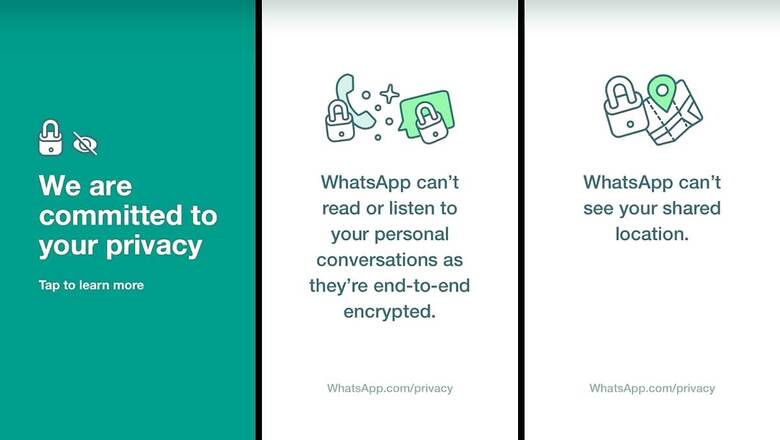
views
After what was a massive PR disaster, WhatsApp tried to do damage limitation by pushing back the implementation of the new privacy policy and terms of use. That is, pushed it back by three months. But not before the Facebook-owned WhatsApp made it clear in an official statement that pretty much puts the blame, and indeed the onus on us as users—apparently thousands, if not millions, of users around the world are confused and misinformed about the update, and hence the confusion and misinformation. Apparently, there was nothing ever to be worried about. Too much ado about nothing. That is what WhatsApp would want you to believe.
At least you won’t have your WhatsApp account suspended or deleted on February 8, as was threatened earlier. Now, WhatsApp says they will do a lot more to clear up the misinformation around how privacy and security works on WhatsApp. The new date for the new policy implementation is May 15. The new date for another controversy, then? Till now, WhatsApp has still not come clean on multiple worrying aspects of the policy, but just keeps repeating the same line over and over again—that no one can read our WhatsApp messages, that it is all end-to-end encryption and that they don’t keep a log of who is messaging or calling whom. That was never the point of the debate and the so-called misinformation. “There’s been a lot of misinformation causing concern and we want to help everyone understand our principles and the facts,” is what the Facebook owned WhatsApp says.
Yet it is WhatsApp who have simply sidestepped the multiple elephants in the room, calmly walked out of the room oblivious to the questions being asked, headed straight for the beach and buried their head in the sand to drown out all the uncomfortable unpleasantness. In all the so-called attempts to counter the so-called misinformation over the past few days, WhatsApp has amplified seven points and repeated them loudly while sticking their fingers in the ears.
WhatsApp is adamant that they do not collect and insist that they are being transparent about user data. First, they say that WhatsApp can neither see your messages or hear your calls on the platform and neither can Facebook. Secondly, they insist that they do not keep a log of who the users are messaging or calling. Third, they say that WhatsApp does not share your contacts with Facebook. Fourth, they insist WhatsApp cannot see your shared location and neither can Facebook (a bit more on this later). Fifth, they say WhatsApp groups remain private. Sixth, they say you can download your WhatsApp data (how this makes any sense is beyond me, but I do admit I don’t know everything. Last but not least, WhatsApp says that you can set your messages to disappear.
If you’ve read the controversial new privacy policy and terms of use, you’d immediately know that this isn’t even scratching the surface when it comes to what needs to be clarified. Hardly anyone in our friend’s circle or among our readers have fretted about someone reading our WhatsApp messages, something WhatsApp believes is the big misinformation point. It isn’t.
One of the suggestions is to use the Disappearing Messages feature in the app. Why would WhatsApp be suggesting the disappearing messages when they insist that they cannot, and neither can Facebook, read anything that I’m sending to friends or they are sending me? If all the data is secure, and chats are encrypted away from any prying eyes, that should be that? It doesn’t make sense to be suggesting both sides of the coin. If this is to save us from ourselves, then it is another matter altogether.
WhatsApp keeps insisting that no call data or message data can be accessed by WhatsApp or Facebook. Then again, that was never really the cause for concern, was it? When the new privacy policy rolled out as an optionally mandatory ‘accept’, the concern revolved around the larger use of user data which WhatsApp has access to and says that they will share with Facebook and other businesses as well.
And this is before we get into the real meat of the controversy that is the new WhatsApp privacy policy and the terms of service agreement.
WhatsApp insists that “when you share your location with someone on WhatsApp, your location is protected by end-to-end encryption, which means no one can see your location except the people you share it with.” Yet, a quick glance over at the new WhatsApp Privacy Policy document suggests otherwise.
Under the Automatically Collected Information, says, “We collect and use precise location information from your device with your permission when you choose to use location-related features, like when you decide to share your location with your contacts or view locations nearby or locations others have shared with you. There are certain settings relating to location-related information which you can find in your device settings or the in-app settings, such as location sharing.” Isn’t this exactly contrary to what the clarification says?
How can it be both of ‘no one can see your location’ and ‘we collect and use precise location information like when you decide to share your location with your contacts’? WhatsApp says, “Even if you do not use our location-related features, we use IP addresses and other information like phone number area codes to estimate your general location (e.g., city and country). We also use your location information for diagnostics and troubleshooting purposes.”
Thought you were smart and disabled location data access on your phone? WhatsApp will still find a way. They claim it is for just diagnostics and troubleshooting. Theoretically, WhatsApp can share even this collected data with Facebook—but we don’t know if it does. Or doesn’t. And we probably never will.
Secondly, WhatsApp has said all along that they do not keep a log of a user’s calls and messages. Yet, WhatsApp gets very close. They may try to portray that such isn’t the case, but they actually do collect a lot of your usage and log information. WhatsApp may not know what you are messaging someone, but they do have a fair idea of how you are using the app. And that will likely include the most connected with contacts too. That’s how the magic of personalization is built and served.
“We collect information about your activity on our Services, like service-related, diagnostic, and performance information. This includes information about your activity (including how you use our Services, your Services settings, how you interact with others using our Services (including when you interact with a business), and the time, frequency, and duration of your activities and interactions), log files, and diagnostic, crash, website, and performance logs and reports. This also includes information about when you registered to use our Services; the features you use like our messaging, calling, Status, groups (including group name, group picture, group description), payments or business features; profile photo, “about” information; whether you are online, when you last used our Services (your “last seen”); and when you last updated your “about” information,” is how the privacy policy document describes it.
As for the worry that thousands of WhatsApp users have is how much of the data is being shared with Facebook. WhatsApp insists that none of the contact details or your location data is shared with the parent company. But with the insistence, WhatsApp is trying to draw your attention to a Live cricket match when there is a leaking ceiling in the same room.
WhatsApp privacy policy document makes it clear that they do share a lot of your information with other Facebook companies. “We may use the information we receive from them, and they may use the information we share with them, to help operate, provide, improve, understand, customize, support, and market our Services and their offerings, including the Facebook Company Products,” say the updated terms of service. Some of the listed utilities for this data sharing are believed to help in improving infrastructure and delivery systems, understanding how a user uses the platforms differently and also promote data safety and security across the board. Mind you, this also means that your data will be used to serve personalized suggestions as well as advertisements targeted at you and your usage trends across a variety of platforms.
The WhatsApp updated terms say this is for “improving their services and your experiences using them, such as making suggestions for you (for example, of friends or group connections, or of interesting content), personalizing features and content, helping you complete purchases and transactions, and showing relevant offers and ads across the Facebook Company Products.” That, no matter what anyone may believe, can only happen if there is a close synergy between two platforms. And that means sharing data.
At no point during this whole PR disaster did WhatsApp actually try to answer the actual questions. It is not a surprise, to be honest. Data is critical to almost every platform at this time, and no one would want to give that up. Yet, when the policy that you’ve drawn up has led to such rounded criticism, blaming the users for falling for what you call misinformation, just shows the insincerity in not only clearing user doubts but also to actually take cognizance of user concerns.
WhatsApp must surely be worried by how quickly its more privacy focused rivals Telegram and Signal have gained new users as people look for alternatives to WhatsApp for good. Telegram has already clocked more than 500 million users while Signal remains the top downloaded app over the past week and a bit more, globally, on the Apple App Store and the Google Play Store. Whether Signal and Telegram are as privacy focused as they claim to be, is another matter altogether. But with their data privacy pitch, they seem to be in the right place at the right time.
Read all the Latest News, Breaking News and Coronavirus News here


















Comments
0 comment